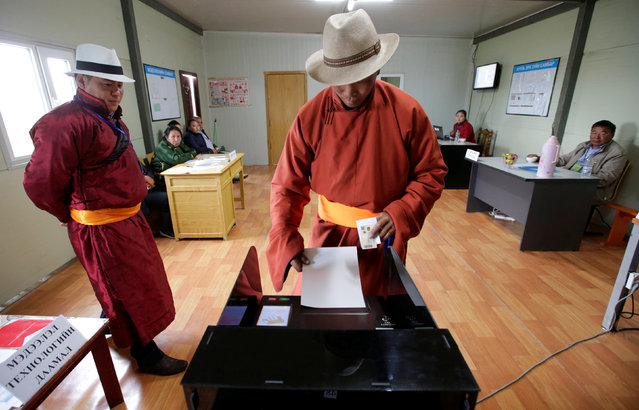
A villager votes for the parliamentary elections at a polling station on the outskirt of Ulaanbaatar, Mongolia, June 29, 2016. (Photo by Jason Lee/Reuters)

A villager reads her ballot paper before she fills it for the parliamentary elections at a polling station on the outskirt of Ulaanbaatar, Mongolia, June 29, 2016. (Photo by Jason Lee/Reuters)
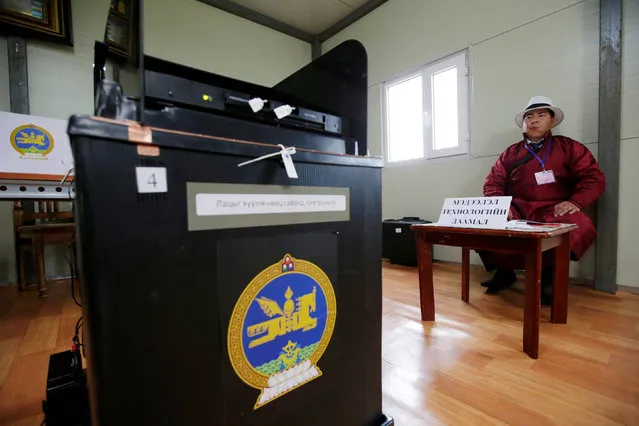
A polling office staff member sits next to the ballot box for the parliamentary elections at a polling station on the outskirt of Ulaanbaatar, Mongolia, June 29, 2016. (Photo by Jason Lee/Reuters)
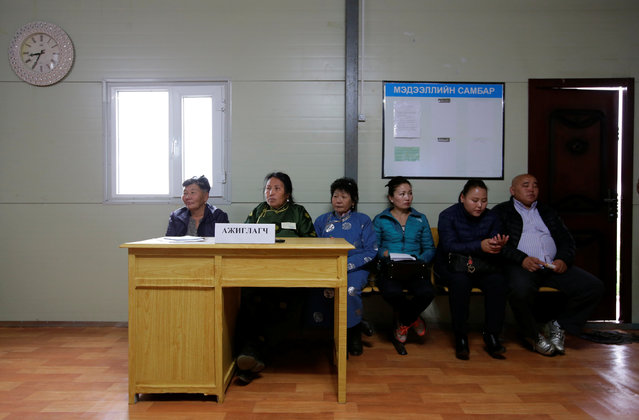
Local villagers, as polling observers for the parliamentary elections, sit in a polling station on the outskirt of Ulaanbaatar, Mongolia, June 29, 2016. (Photo by Jason Lee/Reuters)
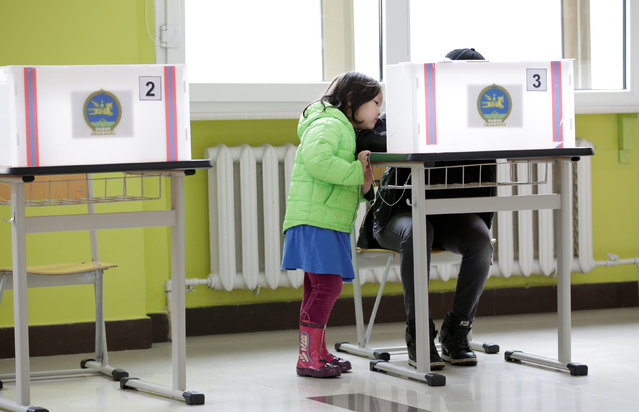
A daughter looks at her mother filling a ballot paper for the parliamentary elections at a polling station in downtown Ulaanbaatar, Mongolia, June 29, 2016. (Photo by Jason Lee/Reuters)
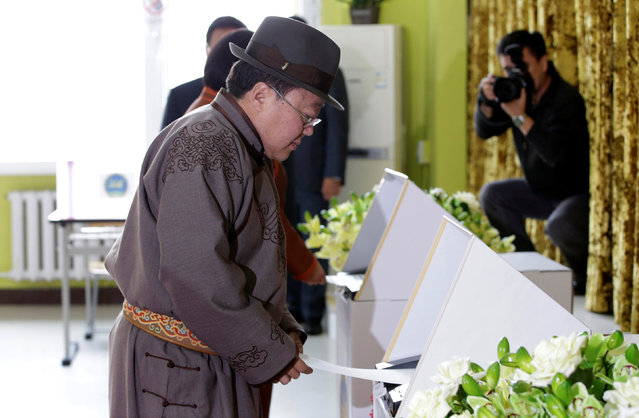
Mongolian President Tsakhiagiin Elbegdorj votes for the parliamentary elections at a polling station in downtown Ulaanbaatar, Mongolia, June 29, 2016. (Photo by Jason Lee/Reuters)
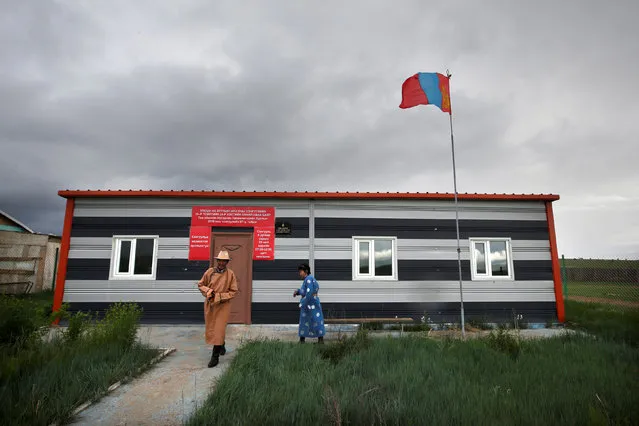
Villagers leave a polling station after voting for the parliamentary elections on the outskirt of Ulaanbaatar, Mongolia, June 29, 2016. (Photo by Jason Lee/Reuters)
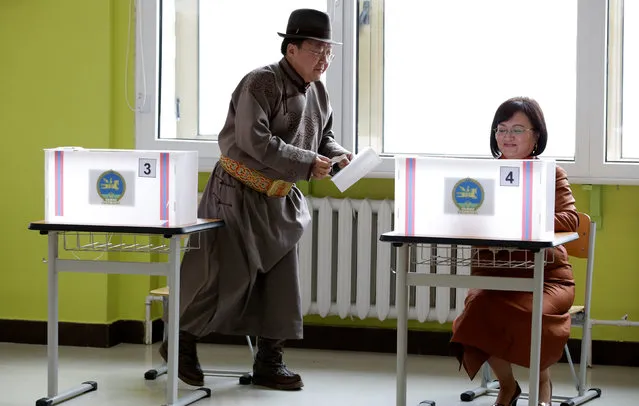
Mongolian President Tsakhiagiin Elbegdorj (L) and his wife Bolormaa Khajidsuren attend voting for the parliamentary elections at a polling station in Ulaanbaatar, Mongolia, June 29, 2016. (Photo by Jason Lee/Reuters)
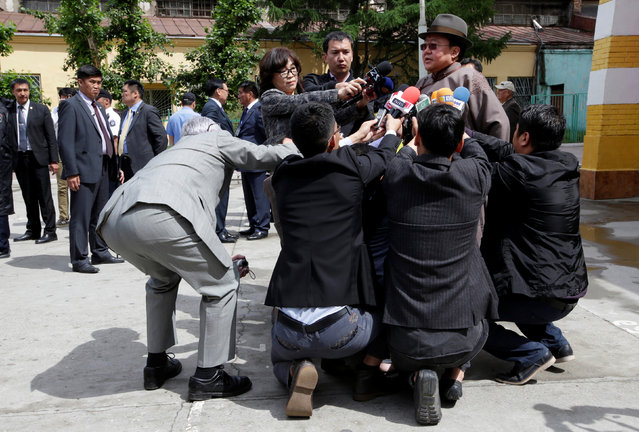
Mongolian President Tsakhiagiin Elbegdorj (C) speaks to the media after he cast his vote for the parliamentary elections at a polling station in Ulaanbaatar, Mongolia, June 29, 2016. (Photo by Jason Lee/Reuters)
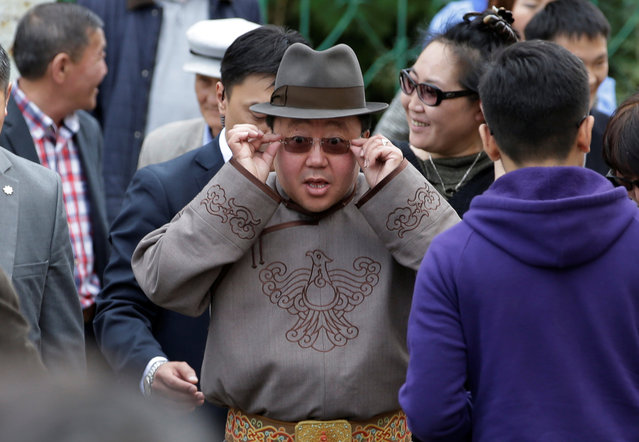
Mongolian President Tsakhiagiin Elbegdorj (C) walks towards the media after casting his vote for the parliamentary elections at a polling station in Ulaanbaatar, Mongolia, June 29, 2016. (Photo by Jason Lee/Reuters)
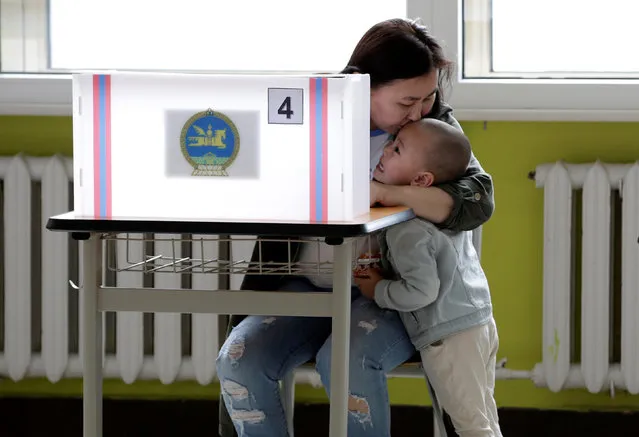
A mother kisses her son as she attends voting for the parliamentary elections at a polling station in Ulaanbaatar, Mongolia, June 29, 2016. (Photo by Jason Lee/Reuters)
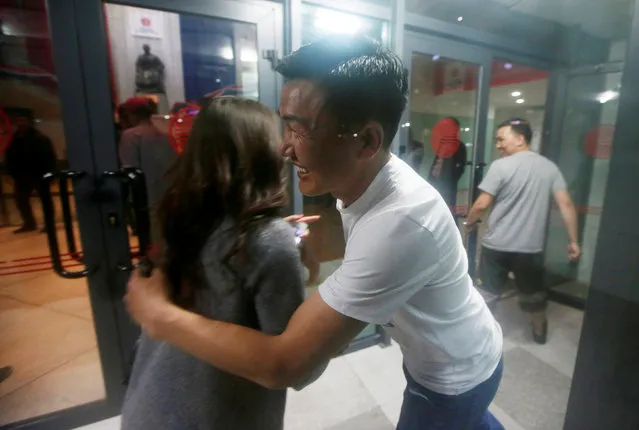
Members of Mongolian People's Party (MPP) celebrate leading in parliamentary elections at their headquarters before the release of official results out, at midnight in Ulaanbaatar, Mongolia, June 30, 2016. (Photo by Jason Lee/Reuters)
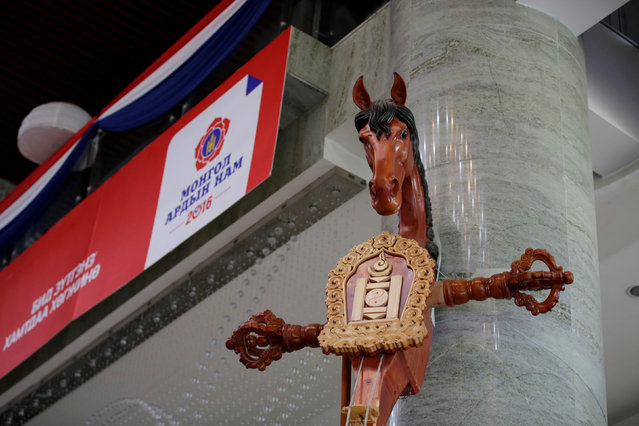
An interior view shows the headquarters of Mongolian People's Party (MPP) in Ulaanbaatar, Mongolia, June 30, 2016. (Photo by Jason Lee/Reuters)
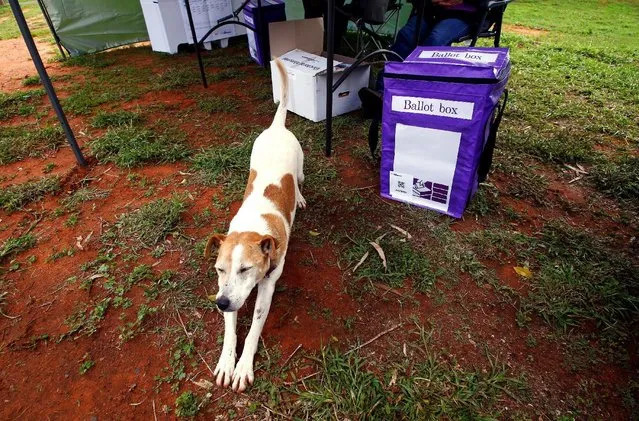
A dog stretches next to a ballot box in the remote voting station in the western New South Wales outback town of Enngonia, Australia, June 22, 2016. Social worker Kelly Ann Mackay and goat farmer Heather McInerney have made sure even those in the most remote parts of the New South Wales outback get a vote in Saturday's Australian elections. The duo are one of three Australian Electoral Commission (AEC) teams that set up 10 temporary booths over a 393,473 square km stretch of outback that is home to 107,409 of the state's 5 million registered voters. The area makes up 48 percent of Australia's most populous state but postal services can be unreliable meaning Mackay, McInerney and co must drive thousands of miles to collect the votes. Similar teams work across other states in Australia, where voting is mandatory and more than 15 million people are enrolled. (Photo by David Gray/Reuters)
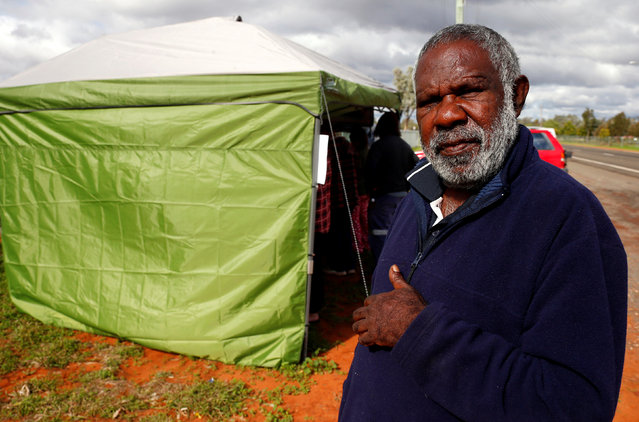
Gordon Sullivan, from a local Aboriginal community, poses near a remote voting station after he voted in the western New South Wales outback town of Enngonia, Australia, June 22, 2016. (Photo by David Gray/Reuters)
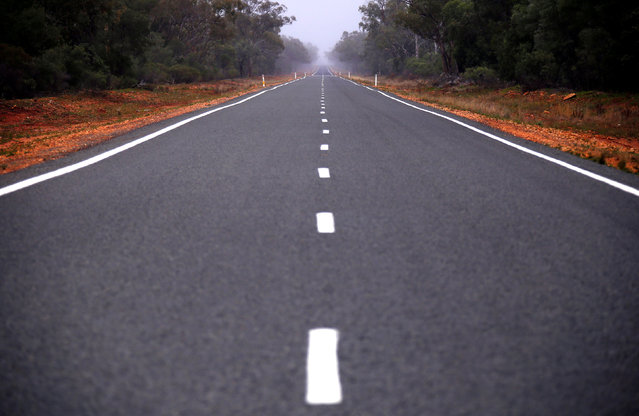
A bitumen road is seen near the western New South Wales outback town of Bourke, Australia, June 23, 2016. (Photo by David Gray/Reuters)
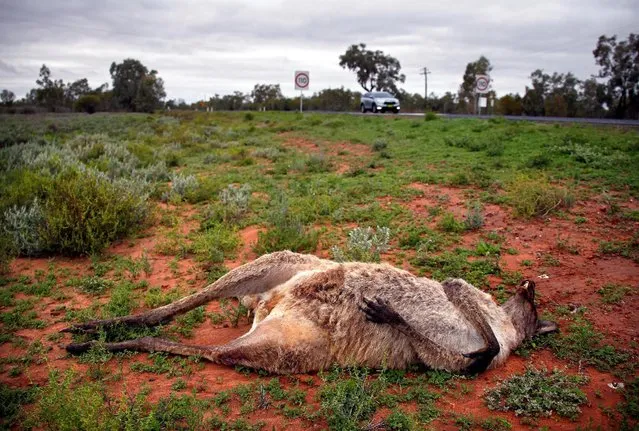
A dead kangaroo is seen on the ground as Australian Electoral Commission officials Kelly-Anne Mackay and Heather McInerney drive their car to assemble a remote voting station outside the western New South Wales outback town of Enngonia, Australia, June 22, 2016. (Photo by David Gray/Reuters)
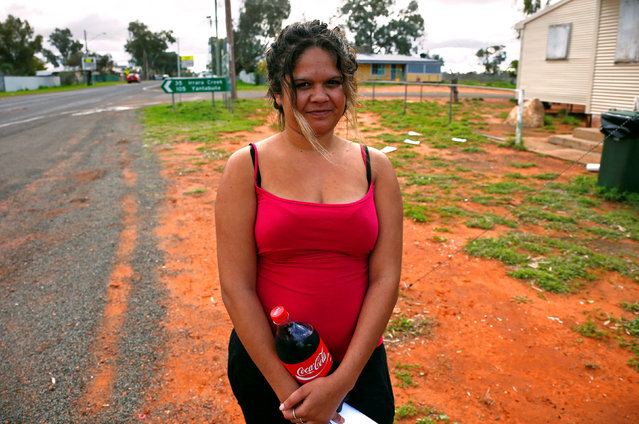
Tara Kelly, from a local Aboriginal community, stands near a remote voting station after she voted in the western New South Wales outback town of Enngonia, Australia, June 22, 2016. (Photo by David Gray/Reuters)
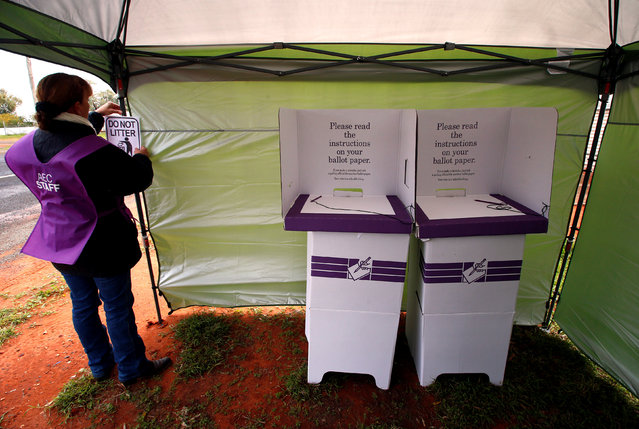
Official Heather McInerney hangs a “No Litter” sign next to voting stands as she prepares a remote voting station in the western New South Wales outback town of Enngonia, Australia, June 22, 2016. (Photo by David Gray/Reuters)
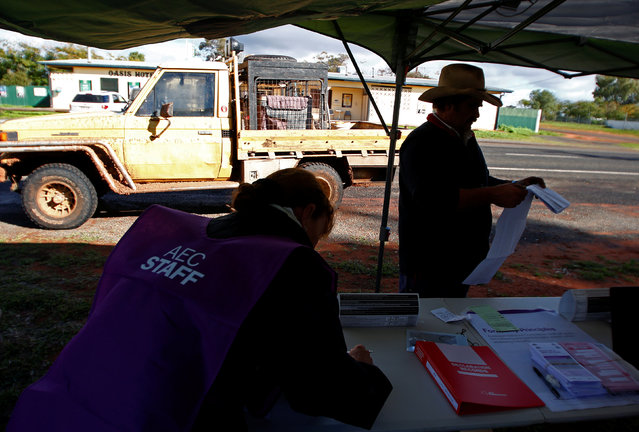
Farmer Darrell Peirpoint holds his Australian Senate ballot paper as assistant Heather McInerney prepares an official form at the remote voting station in the western New South Wales outback town of Enngonia, Australia, June 22, 2016. (Photo by David Gray/Reuters)
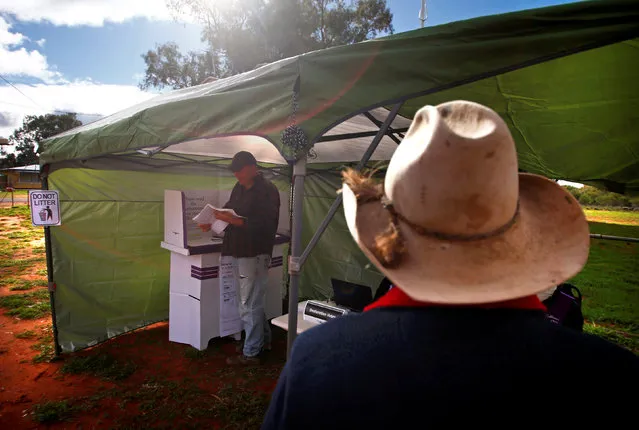
Farmer Darrell Peirpoint watches as a local resident votes in the remote voting station in the western New South Wales outback town of Enngonia, Australia, June 22, 2016. (Photo by David Gray/Reuters)

A flooded dirt road is seen near the western New South Wales outback town of Bourke, Australia, June 23, 2016. (Photo by David Gray/Reuters)
01 Jul 2016 12:25:00,
post received
0 comments
